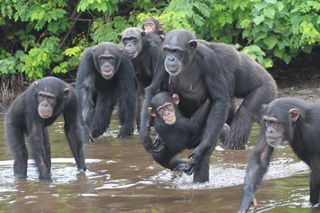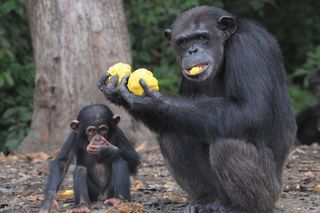These Lab Chimpanzees Are Getting a 2nd Lease on Life
The chimps, which were raised in captivity and could not be released into habitats with wild chimpanzees, had been placed in a Liberian island sanctuary more than 10 years ago, after the NYBC ended the local research program that used the chimps to test a hepatitis B vaccine, in 2004. But the NYBC struggled to determine who would ultimately be responsible for the primates in the long term. And years later, time and money were running short.
Fortunately for the chimps, the HSUS and the NYBC reached an agreement to provide for the animals' ongoing health and medical needs, with the HSUS assuming responsibility for the chimpanzees for the duration of the animals' lives, and the NYBC contributing $6 million to the sanctuary's upkeep, HSUS representatives said in a statement. [Grooming Gallery: Chimps Get Social]
The retired chimps in Liberia have a lot of fellow retiree chimps in the U.S., ever since the National Institutes of Health (NIH) banned all research using chimpanzees in 2013. Like the chimps in Liberia, their U.S. counterparts were relocated to sanctuaries such as Chimp Haven, a facility in Louisiana, and others.
At the Liberian sanctuary, which extends over a series of river islands, there are no cages or enclosures, and the chimps live with their social groups. Food, water and medical attention are delivered by caregivers, NYBC representatives explained on the organization's website.

The NYBC founded the Liberia chimp colony and the hepatitis vaccine research lab in 1974. Contracts with the Liberian government designated the chimpanzees as the property of the Liberian Institute for Biomedical Research (LIBR), a division of the Liberian Ministry of Health, according to the NYBC.
Though the LIBR was expected to assume control of the chimpanzee sanctuary in 2007, as per their contracts with NYBC, that did not happen, and the NYBC continued to provide the animals with the necessities for their survival. But nearly a decade later, the NYBC couldn't afford to continue its voluntary support of the multimillion-dollar effort, representatives explained on the NYBC website.
"Unfortunately, NYBC could no longer sustain diverting millions of dollars away from our lifesaving mission of providing patients over one million critically needed blood products each year," NYBC representatives said.
Sign up for the Live Science daily newsletter now
Get the world’s most fascinating discoveries delivered straight to your inbox.

In 2015, the HSUS became involved in the chimpanzees' plight, culminating in the group's recent announcement that it would take on the care of the chimps for the duration of their lives. The HSUS will even construct basic shelters for the groups of primates, which include male and female chimps that range from infants to elders, according to HSUS representatives.
"The HSUS will work with its members and others to find the resources to make sure these chimpanzees know only human kindness for the remainder of their lives," Wayne Pacelle, president and CEO of the HSUS, said in a statement.
And the chimpanzees' life spans could be considerable; chimps are known to live to be 40 to 45 years old in the wild and as much as 60 years old in captivity, according to the National Primate Research Center at the University of Wisconsin in Madison.
Original article on Live Science.

Mindy Weisberger is an editor at Scholastic and a former Live Science channel editor and senior writer. She has reported on general science, covering climate change, paleontology, biology and space. Mindy studied film at Columbia University; prior to Live Science she produced, wrote and directed media for the American Museum of Natural History in New York City. Her videos about dinosaurs, astrophysics, biodiversity and evolution appear in museums and science centers worldwide, earning awards such as the CINE Golden Eagle and the Communicator Award of Excellence. Her writing has also appeared in Scientific American, The Washington Post and How It Works Magazine. Her book "Rise of the Zombie Bugs: The Surprising Science of Parasitic Mind Control" will be published in spring 2025 by Johns Hopkins University Press.










